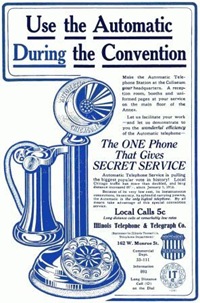
Paper is not an efficient way to communicate information anymore. It’s easily misplaced and fragile. If it gets wet or is put into a flame, it’s destroyed. It’s not very secure, because anyone who has it in their hands can read the information on it. It’s too easy to copy and send to the wrong people. If I need to send a copy to many people, it’s very slow and the paper could get lost along the way. Let’s ban paper.
Telephones are a better way to communicate. I can easily share my ideas quickly with another person by speaking, which is more efficient than writing on paper. I can also talk to multiple people simultaneously on a conference call. It’s not very secure, because it’s easy to eavesdrop on a call. Phone calls aren’t permanent and no one can review them later, unless you record them. Maybe we should go back to paper, since that’s more permanent.
How about computers? This is a much better way to communicate than phone or paper. I can send email to one or many people. I could instant message or chat. I can post information to numerous networks, like Twitter, Facebook, LinkedIn or many other sites. Better yet, I can use a document management or collaboration system to share documents and other content with people. I could use a blog or website to communicate ideas and share information. I can use digital signatures and encryption keys for confidentiality. This is great, get rid of phones and paper.
But, there are viruses and malware that can infect my computer. Hackers are always trying to break into my systems and steal my information. I might send an email to the wrong person. Someone might steal my password and my identity. We should go back to paper, because that’s more secure than either phones or computers.
If you think this is circular logic, you’re right. As new technologies come along, there is always good and bad that comes with it. People still use paper, phones and computers for business and will most likely do it for a long time. Each has its benefits and risks. We need to see the benefits of each and hedge against the risks.
When paper was invented, it was easier to handle than stone tablets so people used it. Sure, it was more fragile, but it was light and easy to use. People kept it away from flames and water and put it into secure envelopes or other enclosures that kept it from prying eyes.
When phones came into use in businesses, some loved them, some hated them. We overcame privacy issues by having a conversation in an office or other secure place, away from prying ears; some may not believe this with all the conversations you overhear on cell phones today. People use secure phones (remember the Cone of Silence on Get Smart) for very private or confidential conversations. We decided the good outweighs the bad.
It’s the same with personal computers. They can be insecure and people can waste time with them, but they’re important business tools. Rather than banning them, we need to understand how to secure them properly and put in acceptable use policies. Somehow these things worked for paper and phones and they will work for our PCs and communications. You have to understand and manage an acceptable risk. Paper is risky, but useful. The same with a phone and computer. Technology can address much of the risk, but not all of it. Teaching people how to use a tool and what not to do with it is important. Technology on it’s own won’t do the whole job. Some common sense and policies around security and use is needed.
Photo credit Wikimedia Commons

